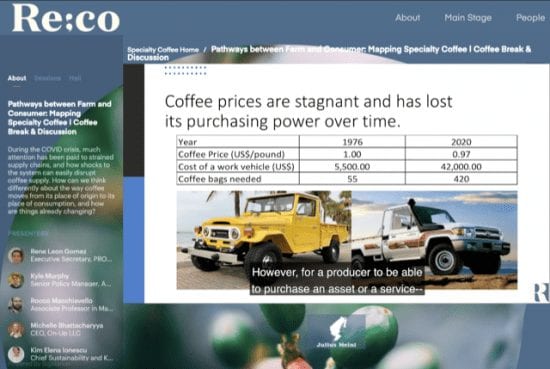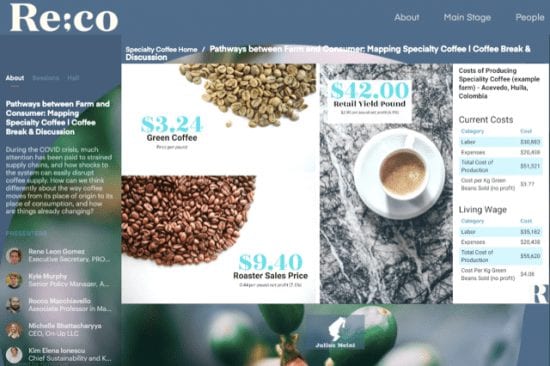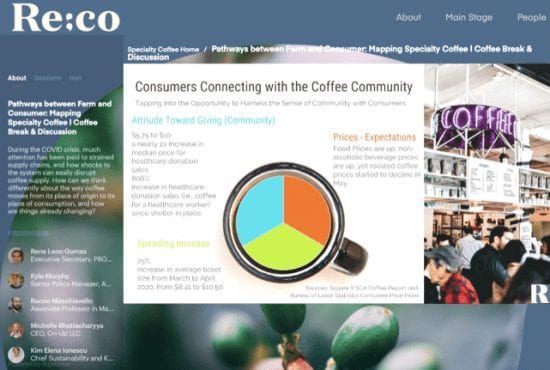
We checked out a panel discussion at the recent Re:co Symposium discussing the crucial importance of the coffee narrative in the supply chain.
BY DEREK ROBINSON
SPECIAL TO BARISTA MAGAZINE ONLINE
On July 16-17, the Re:co Symposium (Regarding: Coffee) brought together some of the finest minds and experts in the coffee industry. One panel titled “Pathways Between Farm and Consumer: Mapping Specialty Coffee” featured Kim Elena Ionescu, Rene Leon Gomez, Kyle Murphy, Rocco Macchiavelo, and Michelle Bhattacharyya, who were tasked to develop the significance and impact of communication in the coffee supply chain. Below is a brief summary and some highlights from each panelist.
KIM ELENA IONESCU—Coffee Mapping and the Supply Chain
Kim is the chief sustainability and knowledge development officer for the Specialty Coffee Association (SCA).
The afternoon began with Kim setting the foundation with a basic understanding of coffee mapping: Farming – Processing – Exporting – Importing – Roasting – Brewing. This basic model is helpful, but lacks the complexities of the interconnectedness from “stage” to “stage.”
Coffee mapping the intricate relationships made Kim ask, “Why does the system work the way that it does? And why doesn’t it work for everyone?” Her goal is to find better solutions for the entire supply chain. “Specialty coffee must address the unequal distribution of value across coffee supply chains and within companies,” she concluded.

RENE LEON GOMEZ—Coffee Producer Sustainability in Mesoamerica
Rene is currently executive secretary of PROMECAFE.
Rene invited listeners to consider, “What do we want the stories behind our cups of coffee to be like?” Many consumers do not connect with roasters, exporters, processors, or farmers within the coffee industry. The amount of moving parts that go into each individual cup of coffee is astonishing when analyzed. These parts tell an amazing story, even if some people do not realize what goes into the product they enjoy.
Rene said he wants the entire supply chain to focus on the collaborative element of the coffee industry. This encompasses two primary goals:
- Strengthening the coffee value chain
- Proactively responding to the coffee price crisis with resilience
To achieve these, he reiterated that an open line of communication must be established throughout the supply chain. “Achieving sustainability requires an agreement between every person that participates in the coffee value chain,” Rene affirmed. Ensuring mutual beneficial support among the chain is critical to sustaining future quality and affordable coffee.
KYLE MURPHY/ROCCO MACCHIAVELO—Technological Social Impacts and Connectivity
Kyle is a senior policy manager at the Abdul Latif Jameel Poverty Action Lab (J-PAL).
Rocco is an associate professor in management at the London School of Economics.
Both Kyle and Rocco revealed the direct link data and statistics to make informed decisions regarding the coffee supply chain. Analyzing factual and counter-factual impacts with data help make the supply chain efficient. Kyle said, “With specialty coffee in particular there’s great potential for connecting farmers to broader markets and increasing incomes through coffee.”
Rocco took this data a step further to conclude that technological advances allow the supply chain to make deeper and more meaningful connections. He stated, “In principle, BCT (blockchain technology) makes it easier for a buyer/roaster to have a contract with [an] exporter/mill that specifies price to be paid to farmer.” These relationships can shorten the supply chain so fewer hands are involved, resulting in higher profit yields for all parties.

MICHELLE BHATTACHARYYA—Living Wages throughout the Supply Chain
Michelle is the CEO of On-Up LLC
Global success in the coffee industry hinges on livable wages. This, of course, is different and wholly dependent on the economic situation from country to country. Ultimately, when individuals and families can support and sustain a pleasurable quality of life, the industry will thrive. Michelle has spent the majority of her work in the coffee industry to promote this attitude and idea. When all can make a livable wage—from the farmer, to the processor, importer/exporter, the roaster, down to the barista—the entire industry grows and is sustainable.
Her research suggests it all originates in establishing community. “Community … where it starts, how far it extends, and how it creates an opportunity like we’ve never had before; to stave off concerns of future price crises, to delink from the C-price, and to focus on building an industry that thrives … not on the backs of workers and smallholder farmers, but because there is a stability brought on by a community where everyone is afforded basic decency … living wages or incomes for workers and everyone in the supply chain,” Michelle zealously concluded.

The Take Away
One theme remained prominent throughout the panel: Coffee is the narrative, the story, the memoir. The importance of knowing the map of a coffee is critical to help ensure growth as global citizens. Coffee is a relational drink providing interconnectivity from farmer to consumer, with the ability to not only provide equity and enjoyment for living, but also education for living. It possesses the unique ability to tell a story from beginning to end. Coffee introduces consumers to producers, who may never encounter one another within their lives, yet provides a window into different customs, languages, cultural norms, and lives.
The deeper the connections throughout the supply chain, the greater the quality, experience, and livelihood for all parties involved. Everyone wants community, so why not use coffee to build engagement with the global coffee network?
Stay tuned for our final panel coverage from Re:co this week.

ABOUT THE AUTHOR
Derek Robinson is a husband, father, teacher, and coffee roaster. His family began Derek Sips because of their fascination and love of the beautiful stories, histories, and flavors of coffee. Be sure to check it out here.

